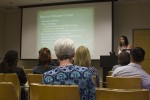At a panel about military sexual assault Thursday, various health professionals and sexual assault prevention workers discussed ways to effectively address issues of sexual assault that occur in the military.
“(This is) a human problem; it’s a societal problem,” said Kristen Zaleski, a clinical assistant professor at the University of Southern California School of Social Work, in front of a room of about 50 veterans, military personnel, health workers and UCLA students.
The Bixby Center on Population and Reproductive Health, an organization that addresses reproductive health issues in the U.S. and developing countries, held the panel event to inform attendees about the obstacles that survivors of sexual assault in the military face in the reporting process.
The event aimed to discuss sexual assault prevention, resources for survivors of sexual assault and ways the military can improve the reporting process for survivors, said Paula Tavrow, the director of the Bixby Program on Population and Reproductive Health.
Tavrow added that media coverage about sexual assault on college campuses partly encouraged her and other organizers of the event to host the panel.
While Tavrow said the center could not find a male survivor of sexual assault for the panel, it wanted to make clear that sexual assault is also an issue that affects men.
A report from the Pentagon released earlier this month revealed that about 5,100 military cases of sexual assault had been reported last year, and about 3,400 cases had been reported in 2012. However, a confidential Pentagon survey indicated that as many as 26,000 men and women were sexually assaulted in 2012.
During the first panel session, guest speakers discussed the history of military sexual assault occurring in different areas around the world.
In her presentation, Zaleski discussed the Rape of Nanking – a 1937 military campaign during which Japanese soldiers invaded the capital of China and murdered and raped Chinese civilians. She also talked about the My Lai Massacre, during which U.S. Army soldiers murdered Vietnamese civilians.
Lori Walsh, a sexual assault response coordinator at the Naval Base Coronado, discussed the different types of resources available to survivors of military sexual trauma and the different channels for them to discuss their experiences.
She said that “restricted reporting” currently exists for survivors – a type of reporting in which survivors can report incidents confidentially without the involvement of military personnel or an investigation.
The second panel at the event featured speakers who had personally experienced military sexual assault and those involved in organizations that provide recovery resources to survivors.
Maricela Guzman, a speaker at the event, discussed her experiences as a survivor of military sexual trauma.
She said she became a workaholic, earning awards for her service in the military, and she didn’t realize until years later that she had been suffering from post-traumatic stress disorder due to the assault.
“I survived by becoming a robot,” Guzman said at the event.
Guzman, a Chicana woman, added that she thinks current media coverage about military sexual assault lacks focus on women of color and on lesbian, gay, bisexual, transgender and queer issues.
Panelists in the final session of the event discussed current legislation and reform for sexual assault in the military in California and across the country.
Zaleski said the Ruth Moore Act of 2013, a bill that aims to make it easier for survivors of military sexual trauma to receive certain benefits and treatment, passed the United States House of Representatives last year.
After the panel discussion, several attendees said they found the panel informative and were glad the organizers decided to put it on.
Claudia Vargas, a graduate student in public health, said she thinks sexual assault is an important subject to address and that violence and the unequal treatment of women should be a topic that people continue to discuss.
Sabine Oishi, a health services researcher for the Veterans Affairs Greater Los Angeles Healthcare System, said she was glad to learn that there were different channels for women in the military to report sexual assault, and that they can do so confidentially without going to their commanding officers.
She added that she thinks it was important for the panel to recognize that sexual assault also affects men in the military.
